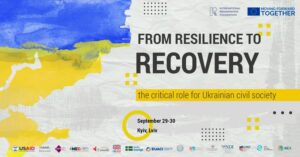
Credit: NDI
If Vladimir Putin is allowed to prevail and sell the war in Ukraine as a victory to his people, it will reinforce Russia’s aggressive posture, embolden the use of force by other autocrats, strengthen current shock waves across global food and energy markets, and set in motion rapid militarization, says Chatham House expert Orysia Lutsevych. Ukraine will continue to sacrifice a great deal to avoid this outcome. That is why the West must help Ukraine win, she writes for the New York Times.
International IDEA’s recent GSoD in Focus report, Supporting Ukraine’s Democracy After the War, argues that sustainable support for Ukraine requires centering and providing respectful support to Ukraine’s democratic institutions.
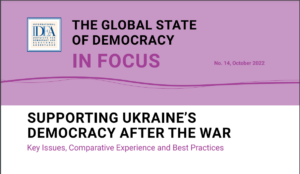 There are three distinct camps when it comes to thinking about how the Ukraine war should end: the realists, the optimists and the revisionists, according to Ivan Krastev, the chairman of the Center for Liberal Strategies.
There are three distinct camps when it comes to thinking about how the Ukraine war should end: the realists, the optimists and the revisionists, according to Ivan Krastev, the chairman of the Center for Liberal Strategies.
- The realists rightly view the current conflict as more dangerous than the Soviet-American confrontation during the Cold War, because the Cold War was a clash between two forces that both believed that history was on their side. The West now confronts a leader with an apocalyptic mind-set, haunted by the specter of a world without Russia.
- The second camp are the optimists. They see the end of war as not just Ukrainian victory but the end of Vladimir Putin. They argue that Russia’s military defeat and the continued effects of sanctions — which will only become more devastating — are clear signs that the Russian president’s time in office is limited, and they support President Volodymyr Zelensky’s unwillingness to negotiate with Mr. Putin….
- Revisionists see the war in Ukraine not as Mr. Putin’s war but as Russians’ war. For them, the only guarantee for peace and stability in Europe after this war ends would be the irreversible weakening of Russia, including the disintegration of the Russian Federation. They argue for supporting separatist movements in the country and keeping Russians far away from Europe regardless of political changes in the country….
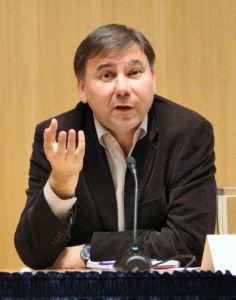 Diverging narratives and visions about the desired end of the war are so emotionally and morally charged that any agreement will be painfully complex, Krastev (right), a longtime associate of the National Endowment for Democracy (NED), writes for the Times. But some common framework for a resolution to the war is urgently needed.
Diverging narratives and visions about the desired end of the war are so emotionally and morally charged that any agreement will be painfully complex, Krastev (right), a longtime associate of the National Endowment for Democracy (NED), writes for the Times. But some common framework for a resolution to the war is urgently needed.
Democracies such as Ukraine, Taiwan and the United States are “natural allies” in fighting China’s cyberwarfare strategy, Taipei’s first digital minister Audrey Tang told the Washington Post‘s Josh Rogin at the recent World Movement for Democracy’s 11th Assembly. But they must do more to prove that their model can work better in a digital world.
Putin continues to hope that Western publics will tire of the conflict and push their governments to concede to his demands, note Melinda Haring, Deputy Director of the Atlantic Council’s Eurasia Center, and Jacob Heilbrunn, the editor of The National Interest. For Washington and its allies, however, failure in Ukraine would simply mean confronting him again on another European battlefield. The faster the West aids Ukraine, the more quickly it can stymie Putin’s ambitions, they write for Foreign Affairs.
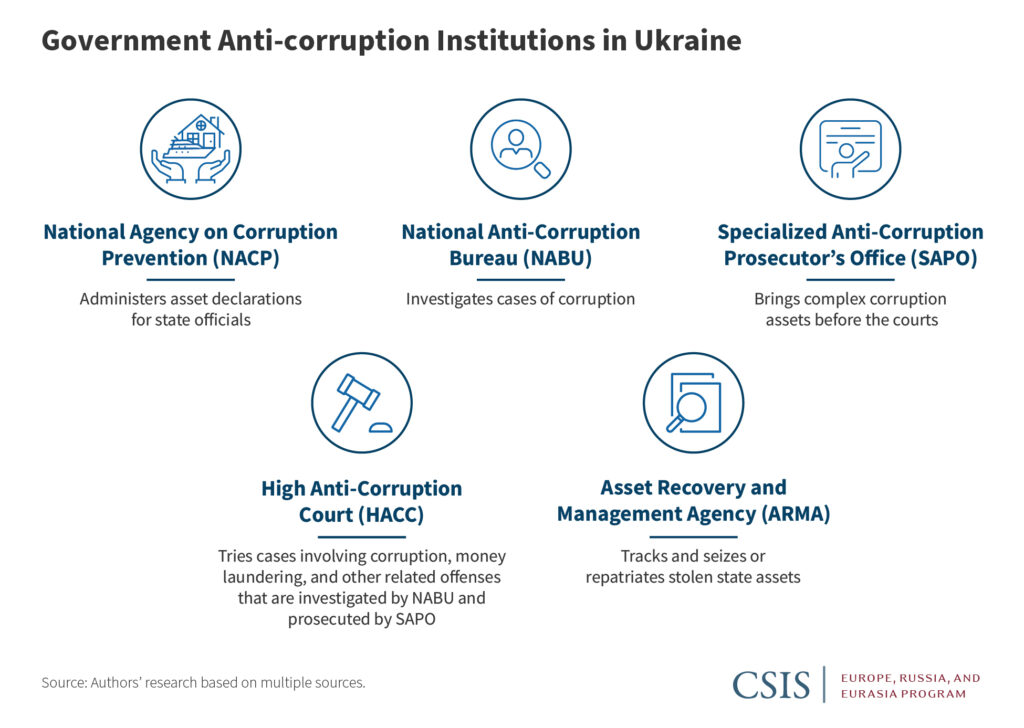
Credit: CSIS
Ukraine has a highly motivated civil society sector whose members have played a major role in developing, promoting, and improving grassroots efforts to develop transparent and responsible institutions and to hold corrupt officials accountable, note CSIS analysts Nick Fenton and Andrew Lohsen:
- The country’s network of anti-corruption organizations and activists extends well beyond the capital. Many regions and municipalities in Ukraine have anti-corruption nongovernmental organizations (NGOs) working to promote integrity and counter malfeasance at the local level.
- While sustainability is a challenge for many organizations in the region, they help promote awareness and advocacy around corruption as an issue that affects all Ukrainians. Moreover, they play an increasingly important role in civic oversight of newly decentralized budgets.
- Ukraine also has a world-class cohort of investigative journalists who are well versed in corruption trends, institutional vulnerabilities, and informal influence networks; are skilled at following the money to reveal illicit schemes; and understand how to convey complicated information to broad audiences.
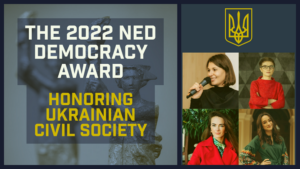 The Supervising and Monitoring Ukraine’s Reconstruction Funds (SMURF) project aims to empower Ukraine’s civil society as the ‘second line of defense’ by providing the necessary expertise and tools to enhance the financial monitoring capabilities of Ukraine’s reconstruction funds, note Kinga Redlowska, with RUSI Europe’s Centre for Financial Crime and Security Studies and Gonzalo Saiz with RUSI’s Project CRAAFT.
The Supervising and Monitoring Ukraine’s Reconstruction Funds (SMURF) project aims to empower Ukraine’s civil society as the ‘second line of defense’ by providing the necessary expertise and tools to enhance the financial monitoring capabilities of Ukraine’s reconstruction funds, note Kinga Redlowska, with RUSI Europe’s Centre for Financial Crime and Security Studies and Gonzalo Saiz with RUSI’s Project CRAAFT.
The NED-funded project will focus on the delivery of in-person and online events, training and study tours to key selected civil society actors involved in the monitoring and management of Ukraine’s reconstruction funds, with a focus on:
- Providing Ukraine’s civil society – financial experts, investigative journalists, activists – with expert tools to properly monitor the allocation of funds and discourage corruption and kleptocracy.
- Building national and international connections to support the fight against corruption in Ukraine.
- Resuming Ukraine’s AML/CTF efforts halted by the war, particularly focusing on adopting adequate legislation such as the Ultimate Beneficial Ownership (UBO).
- Raising awareness on essential aspects of the supervision and monitoring of reconstruction funds through public debate, expert commentaries, and discussion.
- Fostering European cooperation and support for the reconstruction efforts by introducing selected participants to relevant policymakers and actors in Brussels.
- Providing the selected participants with key knowledge of successful public-private partnerships in the fight against financial crime.
- Building an international network of experts to tackle disinformation on corruption that is used as a tool for reducing foreign aid to Ukraine. RTWT
Ukrainian citizens, civil society, political parties, media, business leaders and key democratic institutions continue to drive recovery and reconstruction planning, the National Democratic Institute reports. NDI supported these critical efforts in September through its contributions to a national conference, “From Resilience to Recovery: The Critical Role of Ukrainian Civil Society.”
The @NEDemocracy-funded #SMURF aims to empower Ukraine’s civil society as the ‘2nd line of defense’ by providing the necessary expertise & tools to enhance financial monitoring of reconstruction funds, note @CFCS_RUSI‘s @redlowska & @gonzalosaizer. https://t.co/1TMcOPsVIh
— Democracy Digest (@demdigest) November 8, 2022







